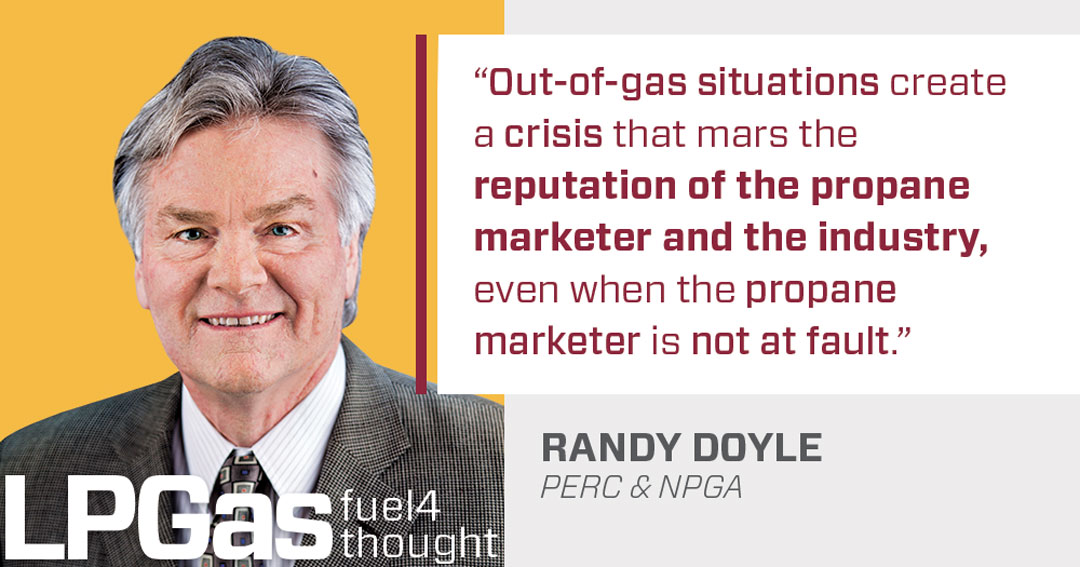Achieving energy reliability
What percentage of your customers ran out of gas in the past three years? Even one is too many. At least, this should be the mindset of the propane marketer and an industry pursuing a reputation of reliability.
It should not come as a surprise that one of the customer’s great fears is running out of gas. Whether it’s the homeowner in the middle of cooking the family dinner or a restaurant owner boiling crawfish for a room full of hungry customers, out-of-gas situations create a crisis that mars the reputation of the propane marketer and the industry, even when the propane marketer is not at fault.
The energy crisis in Texas this past winter only added to customer sensitivity about being without energy. Propane’s “off-grid” position has been a great selling point that proves itself during severe weather and other power disruptions. Propane’s energy independence message now has a larger audience with those who will work from home in the post-COVID-19 world.
The increased demand for grid-independent energy bodes well for propane. We should strive to live up to our energy reliability message, but it is not easy for several reasons. For example, creating the supply and distribution infrastructure to handle peak load demands from severe cold or a bumper corn crop is challenging. Reliable supply means having the capital to build adequate bulk storage and understanding complex contracting and hedging practices. Managing the dynamic demand of the thousands of different types of customers requires expertise, staff time and the tools to perform effectively. For many propane marketers, doing these tasks well requires management determination and prioritization.
Leadership priorities
Nothing happens without leadership commitment. Top-performing owners and operational managers make energy reliability a top priority. There is zero tolerance for out-of-gas situations, even though achieving this goal is challenging. When there is an out-of-gas incident, the customer is put back into gas service with a sense of urgency and safety. Here are five practices of a company committed to energy reliability:
Manage by the numbers: Top-performing marketers measure the number of out-of-gas incidents and close calls, watching for key trends. The cause of the out-of-gas incident is identified and remedied to prevent recurring incidents. They set performance goals.
Staff performance: Responsibility and accountability are clearly assigned for ensuring energy reliability, whether to a central dispatcher, front-line manager or even the bobtail driver. The responsible staff member is equipped with today’s tools – predictive demand system, tank monitors and routing systems – all needed to manage the large volume of data. Teamwork among management, dispatchers and drivers is imperative. Everyone should have a voice when evaluating performance and offering ideas for improvement.
Propane supply: Leading propane marketers have sufficient bulk storage, effectively manage their tertiary storage and responsibly contract for winter needs with reliable propane suppliers.
Bobtail operations: Leading propane marketers manage will-call customers. They do not let the customer dictate their business. Where possible, they move demand away from peak periods. They have a reliable and sufficient fleet of bobtails. They invest in reliable information technology tools needed to know gas levels in the customer’s tank, schedule and route bobtails.
Be tenacious: The tenacious marketer is vigilant about achieving reliability and eliminating out-of-gas incidents. Preventing out-of-gas incidents is a dynamic challenge that demands ongoing improvement.
Are you among the propane marketers dissatisfied with their performance in providing reliable gas delivery? If your answer is yes, begin this summer by rethinking your approach, and implement the changes that will boost your performance next winter. Your business reputation, customers and employees will thank you.
Randy Doyle is a 35-year, semi-retired veteran of the propane industry who consults with Holtzman Propane in Mt. Jackson, Virginia. He is a member of the NPGA board of directors and the PERC council, and is active in the Virginia Propane Gas Association.

















